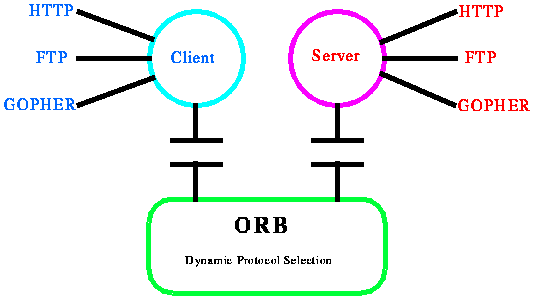
![[ANSA]](../ANSA.gif)
![[ISF]](ISF.gif)
The Information Services Framework within the ANSA Project is developing ways of making the WWW infrastructure support distributed object computing. A recurrent theme in this work is how to support extension protocols. The problem is that at present the WWW appears to be locked into using HTTP as the basic transport protocol. This document sketches our approach to solving the problem using CORBA technology.
This page has been publicised in the hope of generating some discussion and hopefully feedback from others who may be interested in solving the same kind of problem.
The solution starts from the observation that the existing URL schemes, based on URLs beginning with protocol names like http, ftp, gopher, and so on, effectively use these protocol scheme names to define the relevant operations that are possible within each scheme.
Each protocol (HTTP, ftp, Gopher, etc) can be viewed as a set of methods that are used to access particular data structures (HTML:documents; ftp:files; Gopher:directories; etc).
In object terms, a set of methods is an interface, which can be described in an appropriate IDL (Interface Definition Language). A suitable IDL for which a strong standard is available is CORBA-IDL defined by the OMG (Object management Group). The URL scheme then becomes a base type naming scheme which can be extended by adding new object type definitions in IDL.
In object based systems, the interfaces are logically separated from the transport. One can therefore use existing distributed systems technology to carry invocations of the object methods over arbitrary transport protocols. The exact protocol used for a given connection can be negotiated by an ORB (Object Request Broker) depending on the type of object requiring transport and the types of interfaces available.
The potential of this situation is shown in the following diagram:

Here it is obvious how the ORB can select the transport protocol dynamically.
In fact, this is just like the way that the web already copes with the need to support other protocols than HTTP using the proxy mechanism. The way this works is that WWW proxies use HTTP to carry ftp, Gopher and others, so the proposed solution should be seen as an extension of the same principle.
The ANSA ISF group are putting the ideas expressed here into practice.
Converted from text 30 Nov 1995 by <rtor@ansa.co.uk>